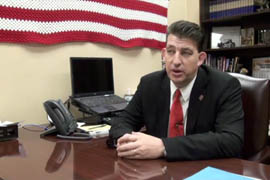Cronkite News has moved to a new home at cronkitenews.azpbs.org. Use this site to search archives from 2011 to May 2015. You can search the new site for current stories.
Lawmaker: Bill to ban any state health exchange more than statement
PHOENIX – A bill that would prevent Arizona from setting up its own health insurance exchange is a political statement on its face, but the author said he intends to do more than just send a message.
Rep. Carl Seel said he wants HB 2001 to lay the groundwork for an alternative to the federal Patient Protection and Affordable Care Act, often called “Obamacare” by opponents.
The measure contains just 12 words: “This state may not establish or administer a state‑based health care exchange.”
Seel said the bill is the first step toward replacing the federal mandate with a system that would place health care reform under the control of individual states.
“It absolutely makes a statement,” Seel said. “And it’s a statement legislators need to make across the country.”
HB 2001 follows a declaration by Gov. Jan Brewer in November that Arizona would decline the provision in the Affordable Care Act that allows states to implement their own health care exchanges. Arizona will default instead to a federally funded exchange when the mandate goes into effect in 2014.
Seel commended Brewer’s decision to reject a state-run exchange, but he said a mere statement of Arizona’s intentions doesn’t go far enough.
“Unless we make it clear in statute, a future governor – or this governor, hypothetically – can come back around and implement the state exchange,” Seel said.
However, HB 2001 may not have the clout to prevent future implementation of a state-based exchange, said James G. Hodge Jr., Lincoln Professor of Health Law and Ethics at Arizona State University’s Sandra Day O’Connor College of Law.
Its brevity is its downfall, Hodge said.
“As drafted, if it really is this one-liner, it doesn’t even tie it to the Affordable Care Act. It doesn’t refer to the ACA, it doesn’t explain what an exchange is,” he said.
Hodge said if HB 2001 were made law, its specificity could leave the door open for a similar type of state-run health care exchange under a different name.
“This … would not outlaw every circumstance,” he said. “I see room for maneuver legally.”
Seel said he is confident the bill’s intrinsic meaning is enough to prevent future implementation of a state-based exchange under another name.
“When you deal with legislative intent, it’s clear we’re not going to participate in the state exchange,” he said. “If they rename it something else, then the intent is still there.”
Diane Brown, executive director of the Arizona Public Interest Research Group, which supports a state-run exchange, said Arizona, not the federal government, knows what’s best for the state.
“The Governor’s Office had said they need more answers on the health insurance exchange. The question that really needs to be answered is why Arizona would cede control to the federal government,” Brown said.
While Seel said he supports protecting state sovereignty, he called that argument flawed. State-based exchanges, he said, allow the federal government to use states to implement bureaucracy.
“If they don’t like a policy we have, they just withhold the money and bully the state into doing whatever it is they want,” Seel said.
Pete Wertheim, vice president of strategic communications at the Arizona Hospital and Healthcare Association, said he considers HB 2001 more symbolic and doesn’t expect it to get far. The AzHHA worked closely with Brewer’s office during the decision-making process last fall.
“First, it’s not necessary,” Wertheim said. “Second, if it were signed into law and policymakers wanted to do a statewide exchange (later on), it would simply be a matter of passing another bill.”
Seel called his bill part of a process. In the long run, he said, he would like to see the Affordable Care Act replaced by interstate compacts, agreements among states that would allow residents to purchase insurance across state lines.
Seel said he plans to introduce legislation this session that would allow for an interstate compact with any state that wants to join Arizona.
HB 2001, he said, is intended as damage control as he and his colleagues work toward overturning the federal mandate.
“It’s like dominoes,” Seel said. “If you don’t have the exchange, you don’t have anything.”








